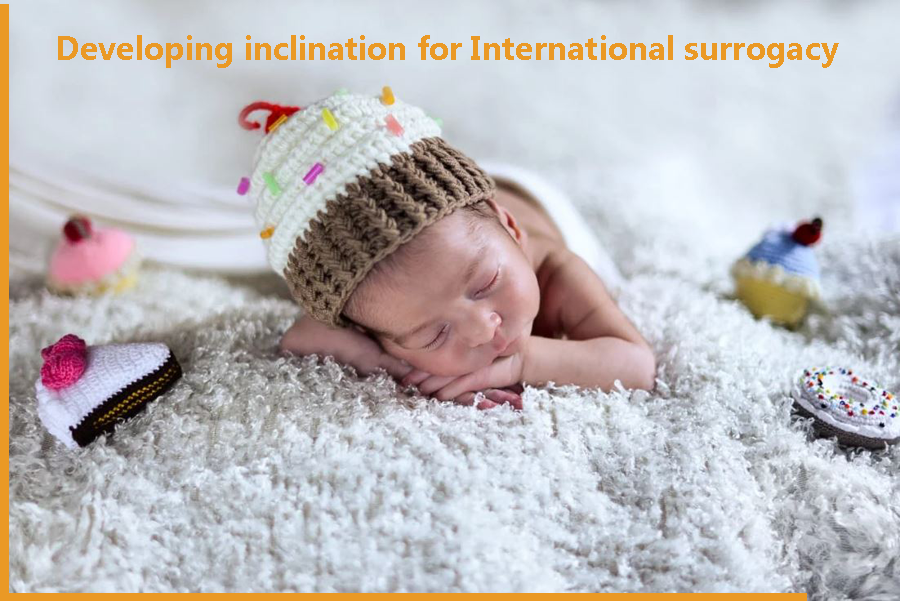Why the role of a legal professional is quite critical for a successful surrogacy journey?
Although it can be a great approach to help people become parents, surrogacy sometimes comes as a complicated procedure with several legal phases. Moreover, starting a surrogacy journey requires establishing a relationship with the appropriate legal counsel. Now, you may or may not have outright access to a legal counsel in a few cases given the wide legal variation across countries.
This is where you have to stay extra careful and cautious during your surrogacy journey. This post will go into the reasons for hiring the best attorney and the role of a legal professional in facilitating a safer and more seamless procedure for all parties. Moreover, before getting into the entire phenomenon, let’s first take a detailed understanding of the concept of surrogacy in various countries.
The role of a legal professional
Understanding Surrogacy
The definition of surrogacy is quite similar across almost every part of the world. The process involves a surrogate mother, the intended parents and the surrogacy agency in a few cases. That said, a woman who accepts to carry and give birth to a child for another person or couple—known as the intended parents—is known as a surrogate. On the other side, the couples or the individuals seeking surrogacy with the help of a surrogacy agency are known as the intended parents. Also, surrogacy mostly comes in two types: Traditional Surrogacy and Gestational Surrogacy.
Traditional surrogacy
The concept of traditional surrogacy involves the surrogate directly inseminated with the sperm of the intended father. Using her own egg, the surrogate in a traditional surrogacy becomes the child’s biological mother.
Gestational surrogacy
During the gestational surrogacy process, the gametes of the intended parents are mixed in a laboratory facility and the resultant embryo is then placed in the womb of the surrogate mother. With gestational surrogacy, the surrogate has no genetic relationship to the child because she carries a child conceived with the egg and sperm of the intended parents or donors.
How a legal professional does comes into the picture?
The role of a legal counselor or surrogacy attorney is to act as a mediator in the entire surrogacy procedure. That said, an attorney who specializes in surrogacy is sometimes called a surrogacy legal professional or lawyer. Their job is to negotiate the murky legal terrain of surrogacy to safeguard everyone’s rights and obligations. The need to establish a relationship with the appropriate legal counsel in a surrogacy program is explained by the following reasons.
Making Sense of Complicated Laws
Different countries and regions have quite different surrogacy laws. That said, some states and nations have well-defined laws, while others have none at all or even outlaw specific kinds of surrogacy. Knowledgeable surrogacy lawyers will:
Know Local Laws: They will be conversant with the particular rules and regulations in your state or nation.
Ensure Compliance: To prevent future legal problems, they will make sure that all acts done adhere to these rules.
Contract Drafting and Assessment
An extensive contract outlining the rights, obligations, and expectations of the intended parents as well as the surrogate is called a surrogacy agreement. This contract is really important in the wake of the complicated procedures that may come your way during the surrogacy journey. That said, an attorney who handles surrogacy will:
Draft proper Contracts: They will create a contract that addresses all pertinent details, such as parenting rights, medical care, and financial arrangements.
Check Contracts: Your lawyer will check any contracts that are supplied by other parties to make sure they safeguard your interests.
Protecting the Interests and Rights of everyone
Rights related to surrogacy include those of the child, intended parents, and surrogates. That said, an attorney who represents surrogates makes sure that:
Rights of Intended Parents: The intended parents are acknowledged as the child’s parents according to the law.
Rights of a surrogate: All along the way, the surrogate’s legal rights, health, and well-being are safeguarded.
Supervising Financial Issues
Surrogacy financial arrangements can be complicated. They frequently cover the surrogate’s compensation, as well as legal and medical costs and more. This is where an attorney who represents surrogates will:
List Financial Terms: Clearly state every financial term in the agreement.
Oversee escrow account management: to guarantee that money is available and used properly, the legal professional will take care of the accounts.
Taking care of the Parental Rights

Get Pre-Birth Orders: They can get a pre-birth order to establish the legal rights of the intended parents before the child is born in certain jurisdictions.
Adoption process: Where a pre-birth order is not feasible, the lawyer can help you with the required adoption processes.
Handling Emotional and Moral Issues
Surrogacy is a complex ethical and emotional decision in addition to a legal and financial one. Among the things a surrogacy lawyer can do is :
Oversee Disputes: Serve as a mediator in cases where the intended parents and surrogate are at odds or misunderstand each other.
Offering support: Provide direction and encouragement all along the way to help everyone negotiate the emotional minefield.
Making Sure Everything Moves Along Well
The surrogacy procedure will go as easily and stress-free as possible if the appropriate attorney is chosen. Their handling of all the legal details will free up the intended parents and surrogates to concentrate on the more intimate parts of the journey.
How to select the right attorney?
Give the following suggestions some thought when choosing a surrogacy lawyer:
Experience: Seek out a lawyer with a great deal of surrogacy case experience.
Reputation: Look into their history, reputation and go over client reviews.
Compatibility: Since you will be collaborating closely with this person all through the process, pick someone you feel at ease with.
Final words
Building a family through surrogacy may be gratifying, but it must be done so with the appropriate legal support. This is where making contact with an informed and skilled surrogacy lawyer guarantees that all legal requirements are met, defending the interests and rights of all parties concerned. With this important step taken, intended parents and surrogates can concentrate on the excitement of welcoming a new life into the world knowing that the legal complexities are in capable hands.












 It’s understood that getting through with any new language is a huge matter of concern for many. Yet, you can learn a bit about the smaller aspects of the same language. Even though you might not be able to speak the language fluently, showing that you are respectful of and committed to the process can be shown by learning the fundamentals. Building a solid, trustworthy relationship with your surrogate can be achieved with even small words or acts of kindness. Learn the fundamentals of practically any language with the aid of a plethora of apps and internet resources.
It’s understood that getting through with any new language is a huge matter of concern for many. Yet, you can learn a bit about the smaller aspects of the same language. Even though you might not be able to speak the language fluently, showing that you are respectful of and committed to the process can be shown by learning the fundamentals. Building a solid, trustworthy relationship with your surrogate can be achieved with even small words or acts of kindness. Learn the fundamentals of practically any language with the aid of a plethora of apps and internet resources.






 The
The 
 The surrogacy laws in the UK are quite complicated for many. That said, upon returning to the UK with their child, parents who have gone through surrogacy overseas have to apply for a parental order to secure their legal rights as guardians.
The surrogacy laws in the UK are quite complicated for many. That said, upon returning to the UK with their child, parents who have gone through surrogacy overseas have to apply for a parental order to secure their legal rights as guardians.
 The importance of self-care is quite imperative during every aspect of life and not just a surrogacy program. That said, self-care is basic for keeping up mental focus and health. For surrogates, this implies taking care of your body through proper nutrition, standard workout, and adequate rest.
The importance of self-care is quite imperative during every aspect of life and not just a surrogacy program. That said, self-care is basic for keeping up mental focus and health. For surrogates, this implies taking care of your body through proper nutrition, standard workout, and adequate rest. Information is the key in today’s era. Whereas remaining educated is important, overconsumption of information and data can lead to data over-burden and increased uneasiness. This is where you must constrain your research to trustworthy sources and avoid delving as well profoundly into online groups or forums that will help you avoid unnecessary issues. Instead, count on your surrogacy agency and medical experts for precise and up-to-date information.
Information is the key in today’s era. Whereas remaining educated is important, overconsumption of information and data can lead to data over-burden and increased uneasiness. This is where you must constrain your research to trustworthy sources and avoid delving as well profoundly into online groups or forums that will help you avoid unnecessary issues. Instead, count on your surrogacy agency and medical experts for precise and up-to-date information.
 While surrogacy has proved its effectiveness in helping numerous couples reach parenthood, it has also led to the development of diverse family structures. At the same time, it also allows people and couples from different backgrounds and circumstances to fulfil their dreams of having children. Moreover, for same-sex couples, surrogacy offers a way to parenthood that includes a genetic connection to at least one partner. Now this is something that other alternatives like adoption may not offer.
While surrogacy has proved its effectiveness in helping numerous couples reach parenthood, it has also led to the development of diverse family structures. At the same time, it also allows people and couples from different backgrounds and circumstances to fulfil their dreams of having children. Moreover, for same-sex couples, surrogacy offers a way to parenthood that includes a genetic connection to at least one partner. Now this is something that other alternatives like adoption may not offer. In any case, surrogacy’s transformative shift isn’t without its challenges. Moreover, the emotional journey for both
In any case, surrogacy’s transformative shift isn’t without its challenges. Moreover, the emotional journey for both